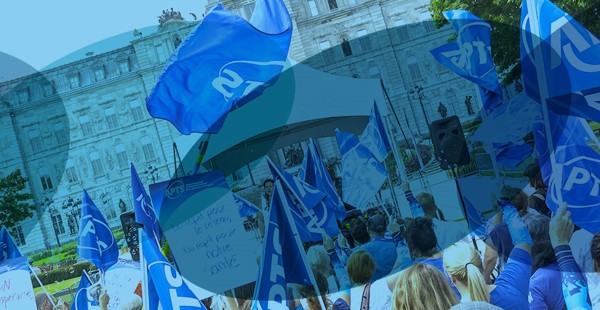Mandatory vaccination | When the best is the enemy of the good
August 26, 2021

Québec City – Vaccination of the greatest possible number of people against COVID-19 is critical to ensure that we move out of the pandemic, and the APTS (Alliance du personnel professionnel et technique de la santé et des services sociaux) continues to strongly encourage its members to get the vaccine. However, the APTS took the opportunity of its appearance before the National Assembly’s Committee on Health and Social Services to share its concerns about the possible consequences of making vaccination obligatory for people employed in the health and social services system.
“The system is suffering from a labour shortage that entails work overload for all of its professional and technical employees,” says APTS interim president Robert Comeau. “So when they tell us they’re going to suspend employees without pay, at a time when our people are already exhausted because they’ve been using every last ounce of their strength to hold the system together, I’m afraid the pressure will become unbearable in some sectors. And my fear is exacerbated by the fact that the government does not have a contingency plan to deal with this situation, which may arise when employees are sent home or when a department is severely understaffed because of reassignments.”
Some of the government’s past decisions, such as forbidding employees to move from one institution to another, proved impossible to carry out because they would have led to a break in services for vulnerable service users, and led to confusion for employees.
“Since the beginning of the pandemic, arbitrary decisions have been imposed on our members, often in an authoritarian way and without consultation,” says APTS vice-president Josée Fréchette. “These decisions have taken away their rights and caused the conditions in which they work and practice to deteriorate. This new infringement of their rights may well be the straw that breaks the camel’s back, impelling them to quit their jobs in a state of exhaustion. The government should avoid the coercive mode at all costs and keep up its efforts to educate people and raise awareness. The goal is to gain support from the greatest possible number. This is how we’ve always done things in Québec, one example being the H1N1 flu in 2009.”
Without any analysis of the impact of mandatory vaccination on the rate of vaccine coverage, or any overall view of the reasons why a small number of people don’t want to be vaccinated, the APTS is left with a feeling that something important is missing, and it is difficult to develop alternative measures. In addition, the government is silent about the measures and penalties it intends to impose on external partners of the health and social services system (private agencies, some providers of private health services, or natural caregivers and visitors) to ensure they don’t jeopardize the efforts being deployed.
“Once again, we get the feeling that public system employees will be the ones who bear the brunt of government decisions, at a time when we need a comprehensive approach,” says Comeau. “From this point of view, the consultations we’ve had this week have been more than welcome. They’ve shown that despite the health emergency, we’re capable of talking openly about issues affecting employees’ rights. It’s too bad this cooperative approach hasn’t been used more often in the past.”
For more information, see the APTS brief on mandatory vaccination (in French).
The APTS
The APTS (Alliance du personnel professionnel et technique de la santé et des services sociaux) represents a total of 60,000 members who play a key role in ensuring that health and social services institutions run smoothly. Our members provide a wide range of services for the population as a whole, including diagnostic, rehabilitation, nutrition, psychosocial intervention, clinical support, and prevention services.

